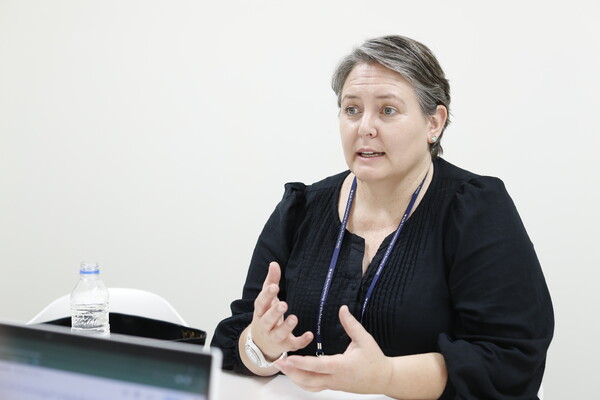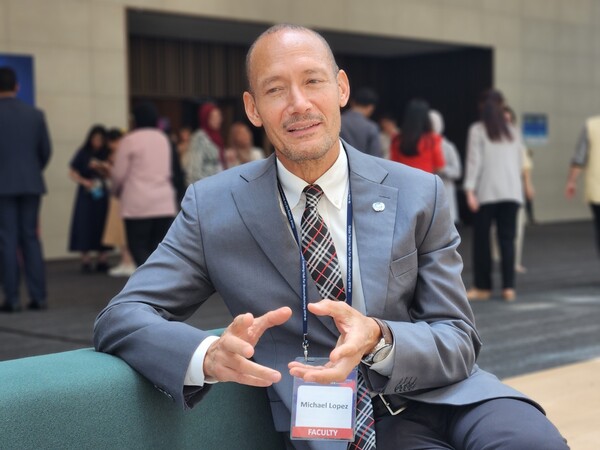With Covid-19 vaccines ushering in a new era for mRNA therapeutics, there has been a lot of buzz surrounding new mRNA therapies in the field of protein replacement therapies, autoimmune diseases, cancer vaccines, and infectious diseases.

Signaling the need for a skilled mRNA workforce, Moderna announced plans to establish an mRNA vaccine manufacturing site in Victoria, Australia by 2024 which is expected to complement Monash’s Center for Advanced mRNA Medicines Manufacturing and Workforce Training to develop an mRNA hub ecosystem.
Jennifer Short, Director of the Monash Center for Advanced mRNA Medicines Manufacturing and Workforce Training, presented to more than 180 trainees on building a future mRNA workforce at the recently concluded World Health Organization Global Training Hub-Bio (WHO GTH-B) Introductory Course to Biologics Development and Manufacturing at Seoul National University Siheung Campus Hotel & Convention Center on Friday.
On the sidelines of this event, Korea Biomedical Review (KBR) spoke to Short to learn more about the Monash mRNA Center’s plans to build this workforce and train individuals from developed as well as low- and middle-income countries.
"Moderna is building an mRNA manufacturing facility located in the Monash Clayton Technology Precinct with deliberate intentions to tap into that pool of talent that's coming through Monash University," said Short. "Likewise, we also plan to work closely with Moderna and other companies to identify specific training needs and develop courses to build the skills and knowledge for those who might not have previously worked in this area."
Collaborating to expand the mRNA ecosystem
The Monash mRNA Center is being established to draw on a pool of biotechnology talent and knowledge at Monash University to deliver best-practice education and training programs across the mRNA pipeline including manufacturing, biochemical engineering, production, lipid nanoparticle, and fill/finish processes.
“We recognized a need to fill gaps between graduates and the industry,” said Short. “We also want to understand where employers find it most challenging to recruit workforce and how we can offer bespoke programs to decrease the lag for someone to enter the industry and become a productive member.”
While she emphasized that the initial focus will be on delivering curricula regarding mRNA vaccines and therapeutics spanning research and development, clinical trials and approval, production scale-up, manufacture, and commercialization, she expects the skills to be transferable to other areas of pharma.
“Often people operate in isolation without understanding the whole drug discovery pipeline but combining these different components provides an opportunity to work together to design a curriculum to optimize manufacturing,” she said.
While Moderna acted as the catalyst for committing to fellowships and partnerships to continue building the mRNA ecosystem, she mentioned that many other industry representatives from small and medium-sized companies, locally and internationally, have already expressed interest in the training programs.
In this regard, she noted an interest in collaborating with Korea to co-develop and co-design courses to create mutual exchanges that take advantage of both countries’ strengths.
“I believe Korea has strong manufacturing knowledge, infrastructure, and support with high interest in the discovery and development of drugs which provides a natural fit with Australia,” she said.
Specific training courses the mRNA training center will offer
“It's still early days for the mRNA workforce training center but we will continue to build our portfolio of courses to be offered in a variety of ways to different cohorts to respond to changing industry needs,” she went on to say.
She stressed that the center focuses on training and certification to support researchers rather than conducting research projects.
In particular, she described a need for increased knowledge and skills around working in the good manufacturing practice (GMP) environment so they’re offering GXP training for participants to learn specific aspects of drug substance manufacturing or drug product formulation.
Additionally, the center is also offering courses in quality assurance and management courses for biologics and mRNA in partnership with the industry. Another course will also be targeted toward mRNA as a therapeutic platform, highlighting its implications, how it's designed, packaged, and delivered to the body, subsequent interactions with the immune system and other applications, and how this impacts its design.
Addressing sustainability in mRNA facilities
Accordingly, the growing interest in mRNA therapeutics has given birth to mRNA manufacturing facilities in many parts of the world such as the WHO mRNA vaccine technology transfer hub in Africa.

However, the sustainability of these facilities specifically designed for mRNA has been called into question.
Adding the manufacturing perspective, International Vaccines Institute (IVI) Consultant, Michael Lopez, shared his opinion on the matter in a separate interview with KBR.
“The whole idea of a sustainable CDMO is that you can manufacture consistently throughout the year but pandemics do not happen consistently so it's hard to sustain the business just on clinical trial activity as there are often times when clinical trials don't get past phase one or phase two,” he said.
As CEO & Chairman of HSL Bio Technologies, a CDMO based in Canada, Lopez explained his strategy.
Some manufacturers dedicate 60 percent of manufacturing to commercial projects and, 40 percent to clinical trials but he explained that he applies an 80:20 ratio as commercial projects are needed to keep the plant working with sufficient earnings to invest in training, equipment upgrades, new technology, and other needs while the remaining 20 percent can be attributed to support clinical trial innovation.
“Investors want to see regular activity which comes mainly from commercial activity,” he said.
He highlighted the actual design of a plant as the other critical factor.
“The footprint of an mRNA plant is different from traditional platforms for sterile manufacturing, recombinant protein therapy, vaccines, or even monoclonal antibodies,” he said. “While mRNA can be manufactured on a smaller scale, with a smaller footprint, at less cost, if a plant is built in this way, it's harder to pivot to the larger scale footprint of monoclonals or recombinant proteins.”
Lopez said the plant should be initially built with the flexibility to pivot and produce other medicines but facilities dedicated solely to mRNA will be difficult to later retrofit for other purposes.
Creating a community of practice
On the same day, IVI completed the “2023 Introductory Course for Biologics Development and Manufacturing” on Friday and awarded a certificate of completion to more than 180 trainees from over 40 countries including 27 from Korea.
Short encouraged the participants to create a community of practice with peers of shared interest and knowledge and an interactive community with a willingness to share ideas and resources.
“It is not easy for employees to get two weeks off so I hope the trainees can take what they learned and share it with their local environment to create opportunities for others to benefit from the ideas generated from this training program to ensure this is not the end of the value chain," Short said.
Related articles
- [GVIRF 2023] WHO, CEPI, AVMI say establishing regional manufacturing easy but sustaining it difficult
- [KBR Exclusive: Inside Boston Biocluster] Moderna's rise to prominence in the Covid-19 era and beyond
- Moderna, KmVAC to develop mRNA vaccines for emerging infectious diseases
- GC Biopharma scores 1st flu vaccine approval on African continent
- Climate change complicating dengue disease surveillance and vaccine development

